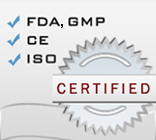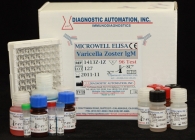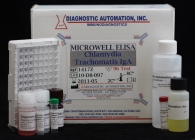
ELISA Kits
- • Anemia ELISA kits
- • Allergy ELISA kits
- • Autoimmune Disease kits
- • Bone Metabolism ELISA kits
- • Blood bank ELISA kits
- • Cancer ELISA kits
- • Cardiac Markers ELISA kits
- • Diabetes Assays ELISA kits
- • Drug test ELISA kits
- • Fertility ELISA kits
- • Food ELISA kits
- • Infectious Disease ELISA kits
- • Other ELISA Kits
- • Parasitology ELISA kits
- • Steroid ELISA kits
- • Thyroid ELISA kits
Rapid Tests
- • Allergy Rapid tests
- • Bone Metabolism
- • Cancer Rapid tests
- • Cardiac markers Rapid tests
- • Drug Tests
- • Fertility Rapid tests
- • Hepatitis Panel
- • Infectious Disease & other tests
- • Other
- • Ovulation Rapid tests
- • Pregnancy tests
- • Urine Reagent Strips tests
IFA Kits
Chemiluminescence Immuno Assays
- • Allergy Assays
- • Autoimmune Thyroid Assays
- • Cardio-Vascular Monitoring
- • Diabetes Assays
- • Fertility Assays
- • Growth Deficiency
- • Infectious Disease Assays
- • Others
- • Steroid Assays
- • Thyroid Assays
- • Tumor Marker Assays
Serology Tests
- • ASO (Anti-Streptolysin-O)
- • CRP (C-Reactive Protein)
- • Mono (Infectious Mononucleosis)
- • RF (Rheumatoid Factor)
- • RPR (Rapid Plasma Reagin)
- • SLE (Systemic Lupus Erythematosus)
Instrumentation



Epstein Barr Virus Early Antigen (EA) IgG ELISA kit
| Name |
Epstein Barr Virus EA IgG ELISA Test |
|---|---|
| Full name |
Human Epstein Barr Virus Early Antigen (EA) IgG ELISA Test Kit |
| Category Name | Infectious Disease ELISA kits |
| Test | 96 |
| Method | ELISA method: Enzyme Linked Immunosorbent Assay |
| Principle | ELISA principle- Indirect; Antigen Coated Plate |
| Detection Range | Qualitative elisa assay- Positive, Negative and Cut-off |
| Sample | 10ul |
| Specificity | 97% |
| Sensitivity | 100% |
| Total Time | ~60min |
| Shelf Life | 12 Months from the manufacturing date |
 |
IgG.jpg&w=195&h=140) |
 |
Epstein Barr Virus Early Antigen (EA) IgG ELISA kit description:
Diagnostic Automation Epstein Barr Virus Early Antigen (EBV-EA) IgG Enzyme-linked Immunosorbent Assay (ELISA), is intended for the detection of IgG antibody to Epstein Barr Virus Nuclear Antigen-1 in human sera and plasma.
Materials Provided with EBV-EA IgG Elisa Kit:
1. Microwell strips: EBV-EA antigen coated wells
2. Sample Diluent
3. Calibrator
4. Negative control
5. Positive control
6. Washing concentrate 20x
7. Enzyme conjugate
8. TMB Chromogenic Substrate
9. Stop solution
Materials required but not provided:
1. Freshly distilled or deionized water
2. Dispensing system and/or pipette
3. EIA kit Microplate washer
4. EIA kit Microplate Reader with 450nm wavelength
EBV-EA IgG Elisa Test Background Information:
EBV is classified as a member of the herpes-virus family based upon its characteristic morphology. EBV infection may demonstrate a wide spectrum of clinical symptoms. The majority of primary EBV infections is transmitted via saliva, occurs during childhood, and is subclinical. Antibody titers to specific EBV antigens correlate with different stages of IM. Both IgM and IgG antibodies to the viral capsid antigen (VCA) peak 3 to 4 weeks after primary EBV infection. IgM anti-VCA declines rapidly and is usually undetectable after 12 weeks. IgG anti-VCA titers decline slowly after peaking but last indefinitely. Antibodies to EBV nuclear antigen (EBNA) detected by anti-complement immunofluorescence develop from 1 month to 6 months after infection; and, like anti-VCA, persist indefinitely. Antibodies to EBNA indicate that the EBV infection was not recent. Antibodies to EA may appear transiently for up to three months or longer during the acute phase of IM in 85% of patients. Elevated levels of anti-EA and IgG anti-VCA may be detected in patients with chronic or recurrent illness suspected of being caused by EBV. However, a diagnosis of chronic EBV should not be based on the presence of antibodies to EA since elevated anti-EA titers may also be found in patients with other diseases as well as in healthy individuals with past EBV infections.
EBV-EA IgG Elisa Test Principle:
Purified EBV-EA antigen is coated on the surface of microwells. Diluted patient serum is added to wells, the anti- EBV-EA specific antibody, if present, will bind to the antigen. All unbound materials are washed away. After adding enzyme conjugate, it binds to the antibody-antigen complex. Excess enzyme conjugate is washed off, and TMB Chromogenic substrate is added. The enzyme conjugate catalytic reaction is stopped at a specific time. The intensity of the color generated is proportional to the amount of specific antibody in the sample.
For more information about ELISA Kits, Rapid Tests, IFA Kits, CLIA Test Kits, or Serology tests, please see our website home page, or contact our Customer Service Representative at 818-591-3030.
Home > ELISA Kits > Infectious Disease ELISA kits > Epstein Barr Virus Early Antigen (EA) IgG ELISA kit
ELISA kits - Rapid tests- Drug tests- Pregnancy test - IFA kits - CLIA assays - Serology tests - Instrumentation
©1992 Diagnostic Automation/Cortez Diagnostics Inc. All rights reserved.


 Varicella-Zoster IgM ELISA Test
Varicella-Zoster IgM ELISA Test
 Syphilis (TPA) IgG/IgM ELISA Test
Syphilis (TPA) IgG/IgM ELISA Test
 HEV IgG ELISA kit
HEV IgG ELISA kit
 Chlamydia Trachomatis IgA ELISA Kit
Chlamydia Trachomatis IgA ELISA Kit
 Epstein Barr Virus VCA IgM (EBV, VCA IgM) ELISA kit
Epstein Barr Virus VCA IgM (EBV, VCA IgM) ELISA kit








